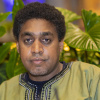Over 55 artists killed in Sudan conflict – ACJPS report
More than 55 artists have been killed in Sudan since the outbreak of conflict on 15 April 2023, according to a report by the African Center for Justice and Peace Studies (ACJPS) and the Sudanese Music Research Center. This toll includes artists who died due to extrajudicial killings, denial of healthcare, and torture while in detention.
 Shaden Gardood was killed on 13 May 2023 after posting messages the day before her death calling for peace and documenting war atrocities.
Shaden Gardood was killed on 13 May 2023 after posting messages the day before her death calling for peace and documenting war atrocities.
The ACJPS report, Tears of Guitars and Screams of Museums, highlights the violations inflicted upon artists since the war began, using field testimonies, interviews with victims’ families, open-source analysis, and satellite imagery.
One victim is poet, singer, and activist Shaden Hussein, better known as Shaden Gardood. Renowned for her social media advocacy and outspoken criticism of Islamist interference in humanitarian aid, Gardood was killed on 13 May 2023, after posting messages the day before her death calling for peace and documenting war atrocities.
Initially thought to have died in a shelling incident, the report reveals that Gardood was actually targeted by a sniper while sitting on the roof of her home in El Obeid, the capital of North Kordofan, with her son and other family members.
“As her companions sought to procure a neighbour’s vehicle to transport her to the hospital, three additional bullets were discharged nearby. Their efforts were further delayed at a Sudanese Armed Forces (SAF) checkpoint,” the report states.
The BBC reported then that Gardood lived in the El-Hashmab neighbourhood, where the national TV and radio building is located and which has become the epicentre of the fighting.
The late singer regularly took to Facebook to call out the perpetrators of the war, describing the clashes and shelling in her neighbourhood.
Originally from South Kordofan state, Gardood used music to promote peace in the region. She was also a researcher who documented the culture of her marginalised Al-Bagara community, especially the legacy of the traditional poets known as Hakamas.
Other artists mentioned in the report include singer and composer Hamdan Azrag, who was killed in a bombing in Omdurman, and Asia Abdelmajid, Sudan’s first theatre actress, who died from random gunfire in Khartoum North (Bahri).
While some artists were directly killed by gunfire and shelling, others faced untimely deaths due to the denial of healthcare. Keyboardist Ibrahim Miko and composer Bashir Abdelmajid both died from treatable injuries after medical services collapsed.
Others succumbed to torture and arbitrary detention, such as percussionist Kamel Hasan, who “succumbed to torture injuries” in Soba prison in Khartoum on August 30 of this year after being detained by the Rapid Support Forces (RSF) in May 2023.
The conflict's impact extends beyond human lives to Sudan's cultural legacy. The report condemns attacks on cultural and historical sites as deliberate efforts to erase Sudan's heritage.
According to the ACJPS report, the Sudanese National Museum was looted, with videos circulating of RSF forces inside the premises. The Natural History Museum in Khartoum was reportedly destroyed by bombing, resulting in the loss of irreplaceable specimens. The Beit El Khalifa Museum in Omdurman suffered damage, and national theatres have either been bombed or repurposed as military bases.
Radio Dabanga reported in May that the old Republican Palace in Khartoum was struck by a Sudanese army airstrike, igniting parts of the building. The palace had already suffered damage from airstrikes in May 2023 and again in August 2023. It came under the control of the RSF at the start of the war in April 2023.
In River Nile state, fighting near the archaeological sites of Nagaa and El Musawwarat in Merowe, along with footage of RSF soldiers in the area, has raised concerns for this UNESCO World Heritage site. ACJPS states, “Due to the subsequent arrival of a military force and the presence of landmines in the area, the current status of these antiquities and any potential damage they may have suffered remains uncertain.”
The report praises artists who have taken a strong stance against the war. Artists such as Abu Aragi El Bakheet, Nancy Ajaj, and Yousef El Mawsili are highlighted for using their art to condemn violence and promote messages of unity.
In contrast, it expresses regret that some artists have “fallen into the trap of polarisation,” using their art to support the warring factions. Nada El Galaa and Kamel Suleiman are cited as examples of artists whose works advocate for the SAF, while artists like Ibrahim Idris have released songs endorsing the RSF.
ACJPS concludes by urging the international community to prioritise the protection of artists and cultural heritage. It calls for stronger measures to safeguard freedom of expression, support peace-focused initiatives, and preserve the country’s historical identity.





















Commentaires
s'identifier or register to post comments